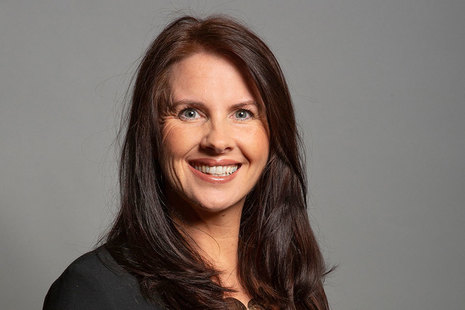Cycling Minister pleaded with children not to cycle on “terrible” roads, pledges action
England’s new cycling Minister admits she has “pleaded” with her kids not to cycle on her local roads, decrying the state of some “terrible”, “so-called cycle infrastructure” – and says building safe cycling routes to enable disabled people, women and children to cycle more is a priority.
Trudy Harrison, who taught Bikeability as a school governor, and has a degree in sustainable communities, told an All Party Parliamentary Group for Walking and Cycling (APPCWG) meeting active travel will be key in decarbonising Britain, and cited the industry’s “significant” contribution to the economy, but she was bluntly honest about the challenges ahead, criticising cycling conditions in her home county, Cumbria, and expressing a particular desire to improve rural routes.
The MP for Copeland who took up the post in January, wants to work with landowners to develop new cycle routes, and says as well as infrastructure a “cultural change” is needed to get more people on bikes, and shift divisive language around drivers and cyclists.
“If we are going to decarbonize and we are going to have a happier, healthier, safer society, then walking and cycling is going to play a huge part”, Harrison told the APPGCW on Monday.
When asked about her priorities Harrison said she wants safe infrastructure for women, children and disabled people to be able to cycle more – and not just in towns and cities.
“The most important thing is making sure that we’ve got the infrastructure as well, so children and women [can cycle], and the fact that cycling can be life changing for disabled people,” she said, adding she wanted to look beyond urban cycling routes to villages, including her own, in the Lake District National Park.
“We do have fantastic cycling infrastructure at Grizedale and Whinlatter Forests, particularly for leisure cycling, but I couldn’t possibly read that out about my own community,” she said, adding her village, Bootle, has “terrible cycling infrastructure”, with a 60mph road between her and the local train station. Part of the reason for her accepting the post was to better understand and develop safer cycle routes locally, “because I know that it makes such a difference to have that segregated designated route for people.”
Harrison also admitted fearing for her children’s safety on local roads.
“I have taught my daughters to ride bikes, along with my husband, but I have many, many times pleaded with them not to go out on their bikes because I’ve been worried about their safety,” she said. “That can’t continue. That’s something that I really want to change. I would like children to be able to walk and to cycle to school.”
She added cycling is “a really significant income generator, about £5.5bn, thousands of jobs. 60,000-something jobs are in the cycling sector, so it’s so important.”
Harrison cited funding allocated to Active Travel England, and new, higher standards, to help achieve cycling growth.
“The key thing is that we want to ensure cycling projects that this government funds are fit for purpose,” she said. “Councils, local authorities looking to roll out infrastructure, will have to adhere to [new design guidance] LTN/120 now and in the future if they want to secure government funding.
“I’ve seen for myself in my own county of Cumbria some pretty poor cycle, so-called infrastructure. A white line on a road does not constitute a cycle route.”
The cycling Minister says working with landowners is key to building routes in rural areas.
“To get an agreement in a local community on a route: pedestrian, equestrian, cyclist you’ve got to work with all of these user groups, and then to secure the land, that’s not easy. I’m really working closely with Victoria Prentis [Minister of State for Farming, Food and Rural Affairs] on how we can work with farmers and other landowners to make it worth their while to support cycling infrastructure, new cycling routes, improved cycling routes. And then after that comes the money – that’s not easy either.”
Prentis is among those in government investigating how to replace EU funding programmes for developing things like cycle routes in rural areas.
When asked by Cycling Industry News about redirecting the fuel duty windfall from oil price rises to active travel, she said while that was a matter for the Treasury the government is investing “six times more than we’ve ever committed” to cycling, adding “I think it’s also important that the roads budget and money that has been spent on transport more generally, looks at the way we design roads with a cycling and walking lens wherever possible.”
(Editor’s note: Today the chancellor has again handed the motorist a 5p on the litre fuel duty cut with a reported £5 billion per year cost to the treasury. The five year walking and cycling budget – at a time of climate emergency – is just £2 billion.)
Harrison echoed her predecessor’s enthusiasm for cycling on prescription, as an alternative to “pills and potions”, and for the e-cycle hire schemes being trialled in Cornwall, that will roll out nationwide soon. She said her husband, who is “the keenest cyclist you could ever imagine” offers his advice on improving cycling conditions, and Harrison admits she used to ride a mountain bike in the Lake District herself, until it was stolen in her 20s. She also says her husband experiences animosity on the roads.
“I feel that sometimes an unhealthy kind of divide is being created between cyclists and motorists – and the reality is that many motorists are often cyclists and many cyclists are often motorists and ultimately, we’re just people trying to get to the places we need to be. And I would very much like to dial down that divide and recognise the value of cycling, for health, for environmental for reducing congestion, for our economy.”
“Somehow we need to find a way through all this and I am very, very keen to be part of the team that improves the way in which we get about.”
The cycling Minister added she “really want to see us, this government, roll out an incredible cycling revolution.”



